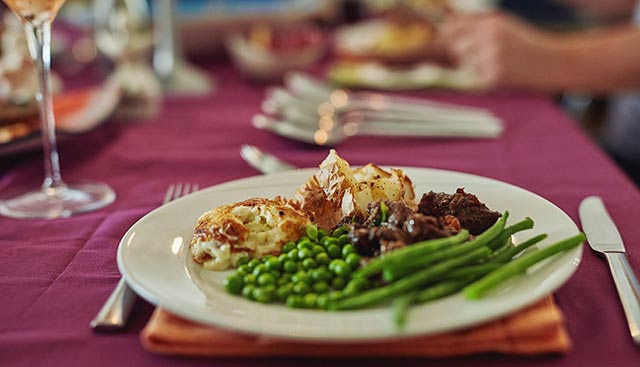
How to Trim Calories From Your Thanksgiving Dinner
Many Americans kick off the holiday season with a bountiful Thanksgiving feast. This meal typically exceeds a whopping 4,500 calories, which is well over the total daily amount recommended for most people. Of course, Thanksgiving is a special occasion, and no one eats like that every day. But, there will likely be more celebratory eating in the weeks that follow, and if you’re not careful, you could end up ringing in the New Year a few pounds heavier.
Healthy eating ideas for the holidays
While holiday-related weight gain is very common, it doesn’t have to be inevitable. By preparing in advance and making wise choices at the dinner table, it may be possible to minimize or completely avoid it. Here are some suggestions from Moffitt Cancer Center:
- Eat a healthy breakfast. Many people skip breakfast on Thanksgiving Day so they will be hungry when they sit down to dinner. However, skipping meals is never a good idea – it can slow your metabolism and actually promote weight gain. Plus, if you start the day with a balanced breakfast, it will be much easier to pass on high-calorie appetizers, such as cheese and crackers, and hold out for the main course.
- Watch what you’re drinking. Empty calories in soda, beer, wine and cocktails can quickly add up. As you savor your meal, alternate these drinks with a glass of refreshing water, or better yet, sip water exclusively.
- Add a light soup course. Many broth- and vegetable-based soups are low in calories, which means they can help you feel fuller faster and avoid reaching for seconds (or thirds) during dinner.
- Choose white meat. Turkey is a lean protein, but it can be even healthier if you opt for breast meat and skip the skin.
- Limit carbohydrates. Mashed potatoes, sweet potatoes and stuffing are Thanksgiving favorites that typically contribute a significant number of calories to the meal. Limiting yourself to one serving of each can make a big difference calorie-wise.
- Create your own sauce. Avoid unnecessary sugar and calories by making or offering to bring your own sugar-free cranberry sauce.
- Focus on vegetables. In addition to being an overall healthy choice, most veggies are low in calories. To make your meal healthier and more satisfying, try to fill at least half of your plate with vegetables.
- Choose your dessert carefully. Consider that a slice of pumpkin pie has fewer calories than a slice of apple pie – and far fewer calories than a slice of pecan pie. If you really love it, though, don’t deny yourself. Instead, share a slice with someone else.
- Stay active. Eating a big meal can make you feel sleepy, but don’t succumb to the temptation of a midafternoon nap. Instead, take a brisk walk outside, and encourage others to join you. You might even make your post-dinner stroll a new holiday tradition.
At Moffitt, we believe proper nutrition – not only during the holidays, but also all year round – plays a vital role in cancer prevention, treatment, recovery and survival. Our dietitians and nutrition specialists work closely with our medical team, providing essential support and contributing to decisions that enhance the overall well-being of our patients. If you’d like more information, call 1-888-663-3488.
